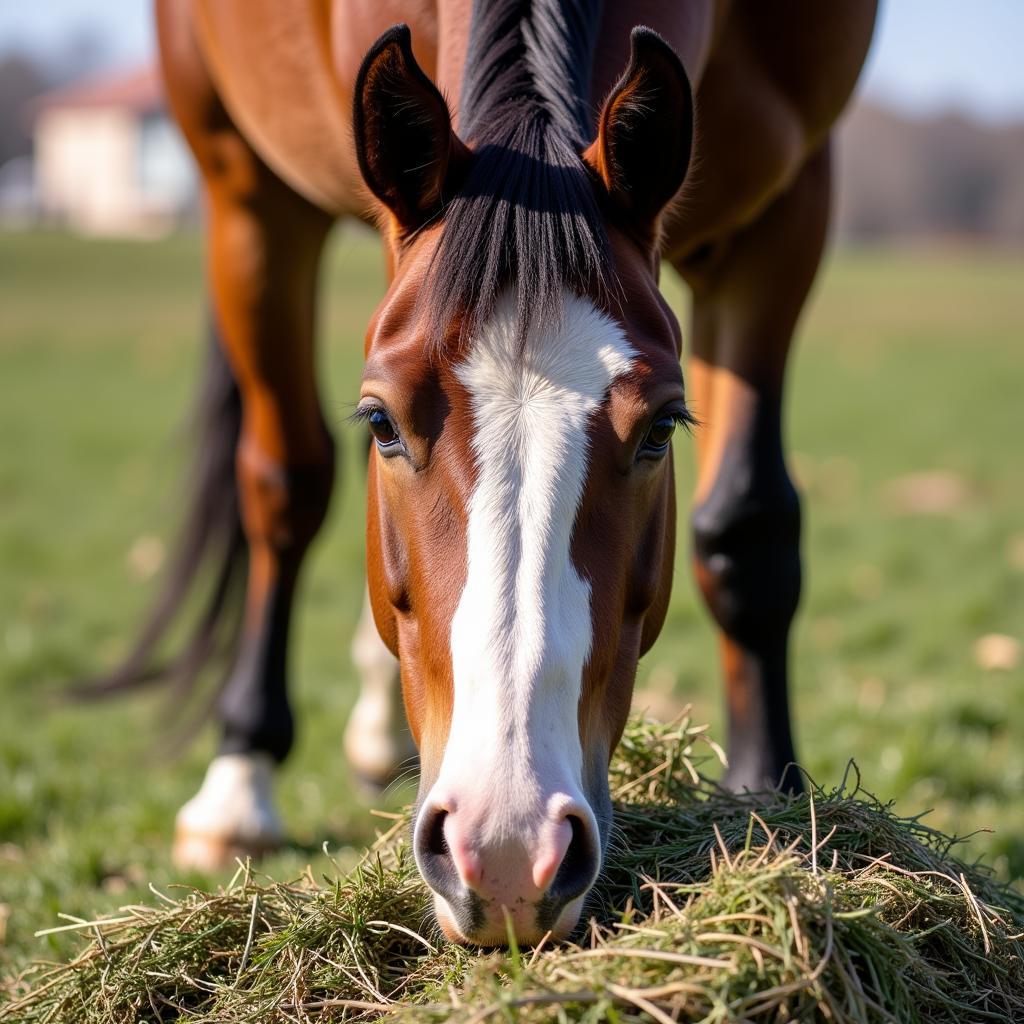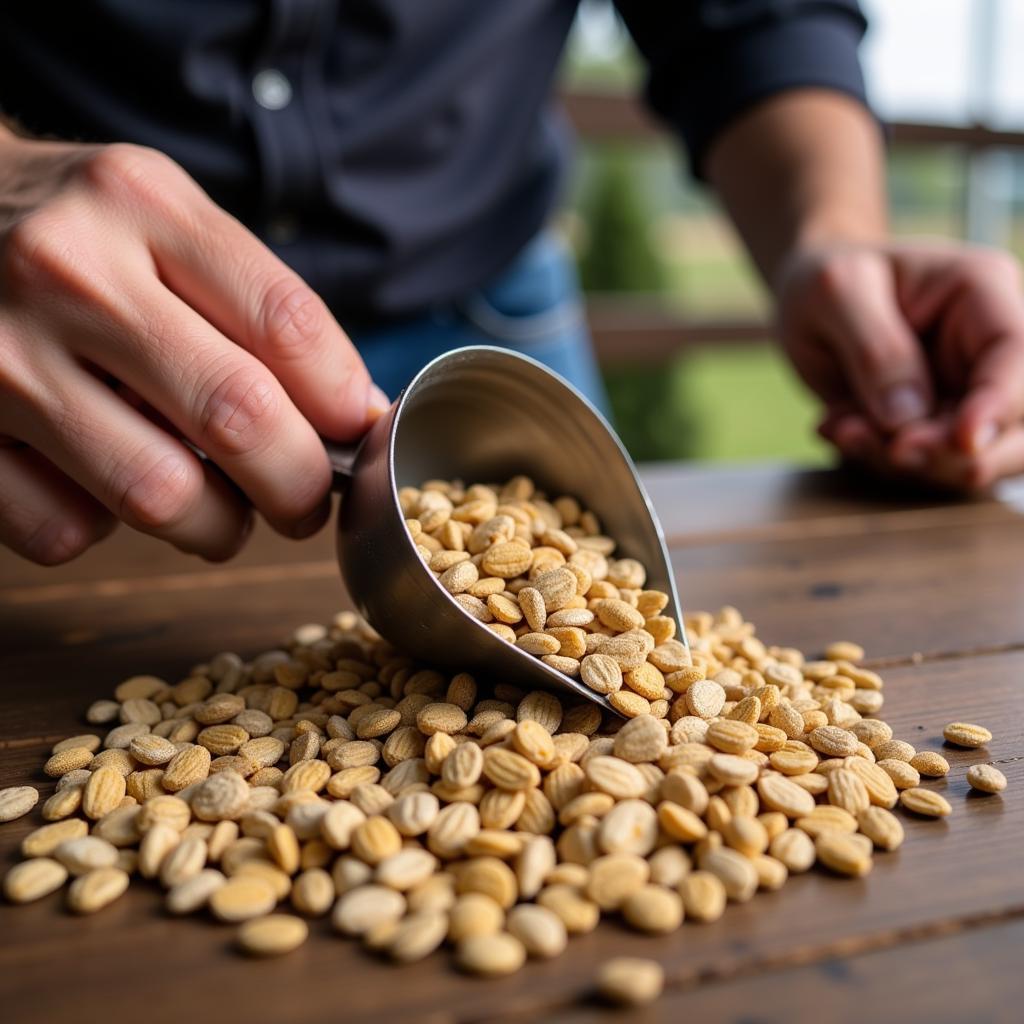Choosing the Best Horse Feeds is crucial for your equine companion’s health, well-being, and performance. Just like humans, horses thrive on a balanced diet that meets their specific nutritional needs. This guide delves deep into the world of equine nutrition, providing you with the knowledge to make informed decisions about your horse’s feed.
Understanding Your Horse’s Dietary Requirements
Before exploring specific horse feeds, it’s essential to understand the foundational elements of equine nutrition. Horses are herbivores, meaning their digestive systems are designed to process plant-based foods. Their diet primarily consists of:
- Forage: This forms the bulk of a horse’s diet and includes grass, hay (such as Timothy, alfalfa, or orchard grass), and haylage. Forage provides essential fiber, which is crucial for healthy digestion.
- Concentrates: These are grain-based feeds that provide additional calories, protein, vitamins, and minerals. Common concentrates include oats, barley, corn, and commercially prepared horse feeds.
- Supplements: These are added to the diet to address specific deficiencies or needs. Common supplements include salt, biotin, and joint support formulas.
 Horse Eating Hay
Horse Eating Hay
The exact proportions of each component will vary depending on factors like:
- Age: Growing horses, senior horses, and pregnant or lactating mares have different nutritional requirements.
- Activity Level: Horses used for riding, racing, or other strenuous activities need more calories and nutrients than those living a more sedentary lifestyle.
- Breed: Certain breeds are prone to specific dietary issues or have different metabolic rates.
- Health Conditions: Horses with conditions like Cushing’s disease or insulin resistance may require specialized diets.
Types of Horse Feeds: Decoding the Options
Navigating the world of horse feeds can feel overwhelming with the plethora of options available. Let’s break down the common types:
1. Complete Feeds
These are formulated to provide all the nutrients a horse needs in a single bag, eliminating the need for additional hay or supplements. Complete feeds are convenient, especially for picky eaters or horses with dental issues that make chewing hay difficult.
2. Grain Mixes
These typically contain a blend of grains, such as oats, barley, and corn, along with added vitamins and minerals. Grain mixes are often fed in conjunction with hay to meet a horse’s energy and nutrient requirements.
3. Pelleted Feeds
These are made by grinding and compressing feed ingredients into small, easy-to-eat pellets. Pelleted feeds are less dusty than grain mixes and can be beneficial for horses prone to respiratory issues. They also offer more consistent nutrition, as the horse consumes all the ingredients in each bite.
4. Senior Horse Feeds
As horses age, their digestive systems become less efficient. Senior horse feeds are specifically designed to address these changes, often containing highly digestible fiber sources, prebiotics, and probiotics to support gut health.
You can learn more about specific senior horse feed options on our tribute senior horse feed page.
Choosing the Right Horse Feed: Key Factors to Consider
Selecting the best horse feeds for your equine partner involves careful consideration of their individual needs. Here’s a step-by-step guide:
-
Consult Your Veterinarian: A veterinarian can assess your horse’s overall health, body condition, and specific dietary needs, providing tailored recommendations for feed choices.
-
Read Feed Labels: Pay close attention to the ingredients list, guaranteed analysis, and feeding instructions. Look for feeds with high-quality ingredients, balanced nutrient profiles, and clear guidelines for feeding rates.
-
Consider Your Horse’s Age: Choose feeds specifically formulated for foals, yearlings, adult horses, or senior horses, as each life stage has unique nutritional demands.
-
Factor in Activity Level: Horses engaged in intense work require higher-calorie feeds with increased protein and fat content, while those with lower activity levels need a diet that prevents weight gain.
-
Evaluate Body Condition: Regularly assess your horse’s body condition score (BCS). If they are underweight, you may need to increase their feed intake or choose a more calorie-dense option. Conversely, overweight horses may require a lower-calorie diet and increased exercise.
 Measuring Horse Feed
Measuring Horse Feed
-
Transition Gradually: When switching your horse to a new feed, do so gradually over 7-10 days. This allows their digestive system to adapt and helps prevent digestive upset.
-
Monitor for Changes: Keep a watchful eye on your horse’s appetite, weight, and overall health after introducing a new feed. If you notice any adverse reactions, consult your veterinarian promptly.
Common Mistakes to Avoid
Even with the best intentions, horse owners can make mistakes when it comes to feeding. Here are some common pitfalls to avoid:
- Overfeeding: This can lead to obesity, laminitis (a painful hoof condition), and other health problems.
- Underfeeding: Not providing enough calories or nutrients can result in weight loss, poor performance, and compromised immune function.
- Feeding Spoiled or Moldy Feed: Always check your horse’s feed for signs of spoilage, such as a musty smell, discoloration, or the presence of mold.
- Inadequate Water: Ensure your horse has access to fresh, clean water at all times, especially during hot weather or periods of increased activity.
Beyond the Basics: Exploring Specific Horse Feed Brands
Now that you have a solid understanding of the fundamentals, let’s explore some popular brands of horse feed:
-
Purina: Known for their wide range of equine nutrition products, including the highly regarded Purina Ultium horse feed line, which offers specialized formulas for various life stages and activity levels.
-
Triple Crown: This brand focuses on using high-quality ingredients and innovative formulations to support digestive health and optimize performance.
-
Nutrena: Offers a diverse selection of feeds, supplements, and feeding programs designed to meet the needs of horses from all walks of life.
Remember to conduct thorough research and consult your veterinarian to determine which brand and specific feed best align with your horse’s individual requirements. For instance, you can explore options like the MG 12 8 horse feed if you’re looking for a specific nutrient profile.
Expert Insight
Dr. Emily Carter, a renowned equine nutritionist, emphasizes, “Feeding horses is not a one-size-fits-all approach. It’s about understanding your horse’s unique needs and providing them with a diet that supports their overall health and well-being.”
Conclusion
Choosing the best horse feeds is an integral part of responsible horse ownership. By understanding your horse’s individual needs and following the guidelines outlined in this comprehensive guide, you can ensure your equine companion thrives on a diet that fuels their body and supports their long-term health. Remember to consult your veterinarian for personalized advice and to address any specific concerns.
FAQs
1. How much should I feed my horse?
The amount of feed your horse needs varies depending on their age, activity level, metabolism, and the type of feed you choose. Always consult the feeding guidelines on your chosen horse feed and consult your veterinarian for personalized recommendations.
2. Can I feed my horse treats?
Treats can be given in moderation but should not replace a balanced diet. Choose healthy treats, such as apples, carrots, or commercially prepared horse treats, and avoid sugary or processed snacks.
3. What are the signs of a healthy horse?
A healthy horse will have a shiny coat, bright eyes, a good appetite, regular bowel movements, and a healthy weight. They should be alert, active, and free from signs of discomfort or illness.
4. What should I do if my horse stops eating?
Loss of appetite in horses can be a sign of an underlying health issue. If your horse refuses food or exhibits other unusual symptoms, contact your veterinarian immediately.
5. How can I learn more about specific horse feed options?
For more detailed information on different types of horse feeds and specific brands, visit our website’s dedicated pages on horse pellet feeder and explore the range of products available.
Need More Help?
For further assistance in choosing the right horse feed for your equine companion, feel free to reach out to our team at Justus Horses USA. Contact us at:
Phone Number: 0772127271
Email: [email protected]
Address: QGM2+WX2, Vị Trung, Vị Thuỷ, Hậu Giang, Việt Nam
Our dedicated customer care team is available 24/7 to provide expert guidance and support.